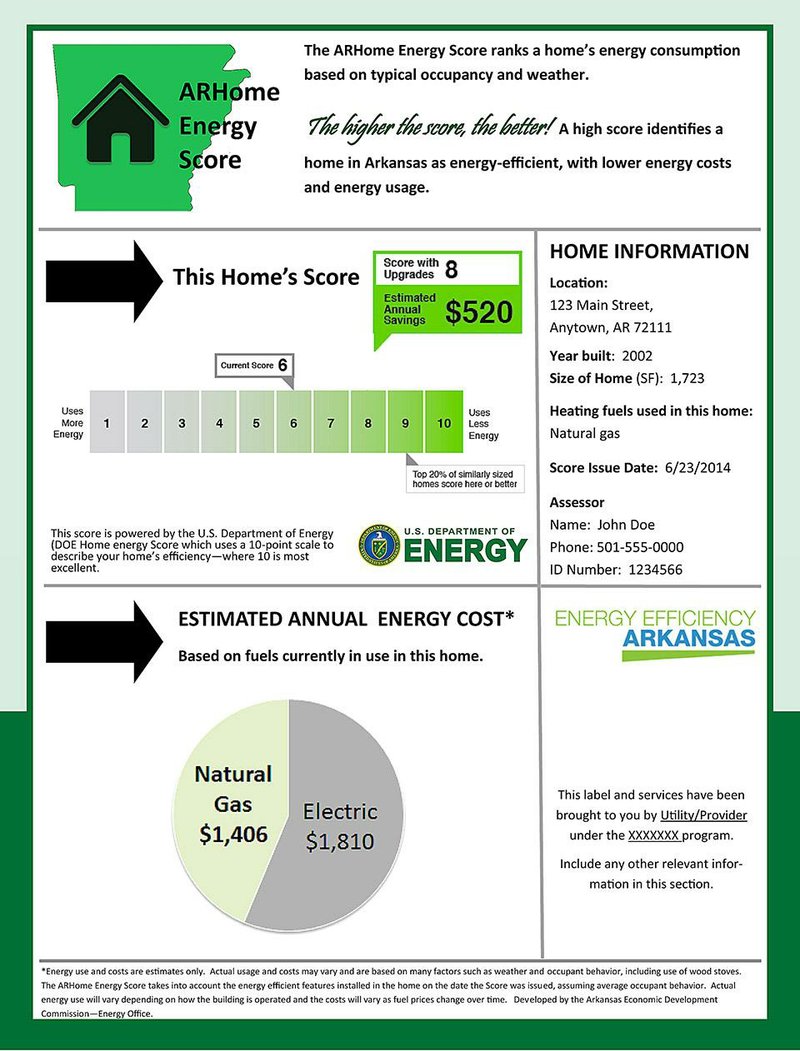Appliances have energy labels and cars have miles-per-gallon stickers, but homes, which use more energy than either, aren’t labeled at all.
That will change for some homes in Arkansas. The Arkansas Economic Development Commission received a $225,000 grant from the U.S. Department of Energy to develop a label that will show how much energy a home uses annually, how it compares with other homes on a 1-to-10 scale and ways to improve efficiency specific to the home.
Use of the label will be voluntary for homeowners and builders, said JD Lowery, director of the Arkansas Energy Office. He said the label will probably be fully developed next year.
“It’s very similar to the yellow label you would find on a big appliance in a Home Deport or the mpg sticker on a car,” he said. “The hope is to get the buy-in of utilities to utilize this as a standard for their programs.”
The office, which recently updated the Arkansas Energy Code, floated the idea of requiring a label for newly constructed buildings. Developers pushed back, saying that it would be expensive to perform the required testing on every new house.
Instead of requiring it, the office decided to pursue the voluntary program so developers who want to show the energy efficiency of their homes have a standard to follow, Lowery said. It benefits builders who put in extra insulation or install Energy Star appliances and seek to convince consumers of the value of those upgrades, he said.
The Arkansas Energy Office is planning to begin a pilot program with North Little Rock, Fayetteville and the state’s weatherization assistance program. The office is partnering with Alabama, which will develop a similar label; the University of Arkansas Applied Sustainability Center; and Earth Advantage, an Oregon nonprofit.
Jill Ponder, energy services manager for the North Little Rock Electric Department, said the label will be used in conjunction with the department’s free home energy evaluation.
“The goal of the Home Energy Label would be to provide a score to recognize energy performance, give value for current energy efficiency and provide a way to compare the energy efficiency of a home to other homes scored in the area,” she said. “Really, it’s going to take our home energy evaluations to the next level.”
Firms like Home Energy Rx, a Little Rock company that performs home energy audits and new home energy ratings, would perform the tasks required to generate the label.
Gary Kahanak, director of the new homes division for the company said new homes in Fayetteville — which are required by a 2012 city ordinance to have an energy label — are typically 15 percent to 20 percent more efficient.
“I have no doubts that we are building much better performing homes,” he said. “I know that because we see the subcontractors, the insulators, the framers, the heating and ventilation technicians, and we have to educate them on how to change their technique.”
Fayetteville requires a Home Energy Rating System score, which was developed by the Residential Energy Services Network. The Arkansas label will instead rely on the Department of Energy’s Home Energy Score assessment.
Kahanak said the Home Energy Rating System is thorough, but more expensive — about $700 for a home. Raters must inspect insulation and ductwork in homes under construction and input the home’s parameters into a computer model.
“The sticker price goes up, but the cost of homeownership goes down every time,” he said.
The Home Energy Score is a simpler and cheaper assessment. Raters input home characteristics, such as details about the heating and cooling system, location and insulation. Homeowners are given a scorecard that shows how the home ranks from 1 to 10 and what the annual electricity bill will look like. It’s not as accurate, but cheaper to complete.
“Some will argue the [Home Energy Rating System] is best, and it may be, but the higher cost prevents it from market adoption, at least in our experience,” Lowery said.
